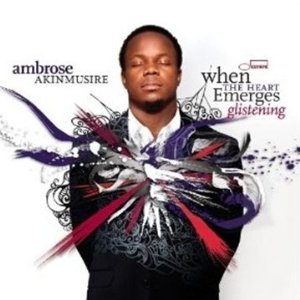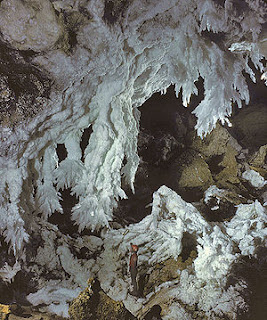 |
| Walter Smith III TWIO Whirlwind Records |
Houston born Walter Smith III is now a West Coast based, no nonsense tenor
saxophonist who is amongst the leading voices on his instrument. I have been
following his work since I first heard him on his Live in Paris from 2009 and later on Ambrose Akinmusire’s When the Heart Emerges Glistening from
2011. At the time he was a strong ensemble player who worked particularly well
with trumpet players like Terrence Blanchard, Christian Scott, Sean Jones and Ambrose Akinmusire on a front line.
On his latest effort Twio
(think of Elmer Fudd saying trio), soon to be released on February 9, 2018, his playing as a leader has matured and become more confident.
He is joined on six of the nine songs on the album, by the plucky bass of
Harish Raghavan and the percolating drums of Eric Harland. For the other four
songs Harland remains on traps while the bass chair is taken over by the ubiquitous
jazz ambassador and uber-bassist Christian McBride. On two of the songs Smith
is joined by the second tenor saxophone of Joshua Redman. As the saxophonist has said in his promo materials, the songs were chosen to be more accessible and are about community and having fun. It seems with Twio he has accomplished what he set out to do.
The set starts off with a loping version of Monk’s “Ask Me
Now.” Smith’s bold tenor sound starts
off with Raghavan’s brash bass out front and deliberate in its steadfast march
as Harland playfully, dances around the rhythm. It’s Smith’s smooth, lustrous tone
that is front and center here, as he works the melody with a marvelous sense of
confident mastery. His explorations, especially when he solos alone, naked with
his horn with no background rhythm section for support, are marvelously free
and inventive.
On the Jerome Kern standard “Nobody Else But Me” we hear
some intuitive interplay between Raghavan and Smith as the freewheeling Harland
mixes it up. Smith’s sax has a loose limber feel to it both within the melody
line and when he delves into some quicker paced harmonic explorations, yet he
always seems to maintain the core melodic line of the song when he is playing. He
has a knack of keeping the listener always engaged even when he improvises.
The cowboy inspired “On the Trail” finds bassist McBride, his
big round bass and his signature stutter step, double-time lines leading the
drive. Harland is more in the pocket on
this song and we are treated to the dual tenor saxophone line of Smith and Joshua
Redman. The song brings back memories of Sonny Rollins venture into cowboy songs
with his Way Out West album. While
neither saxophonist has quite the same big, biting sound of Rollins, they each have
their own identifiable sound and play off the other with great dexterity and
purpose. After alternating the melody between them, the two saxophonists offer
their own take on the melody before trading licks in a friendly exchange of
ideas; a fine addition to the tradition
of tenor saxophone sparring matches by the two young titans.
The C. Fischer ballad “We’ll Be Together Again” is
played as a saxophone and drum duo. We hear an unusual metronomic drum entrance
by Harland that has the cadence of a slow strip. Smith’s round Dexter Gordon-like
tenor rings through the melody with a mellifluous warmth that is quite sensuous
as Harland adds percussive accents around the slow tempo beat.
McBride and Harland return for the Sammy Fain classic “I’ll
Be Seeing You.” Smith’s languorous saxophone
states the melody solo before McBride’s buoyant bass and Harland’s traps enter.
At about the two minutes mark the group picks up the pace and turns it into a
medium tempo swinger with McBride’s bass leading the charge. A fleet fingered
bass solo gets you snapping your fingers before Smith returns and restates the
melody with a nuanced sensitivity that is compelling.
On Wayne Shorter’s “Adam’s Apple” bassist Raghavan returns providing
a throbbing backdrop. The trio takes on a more modern feel, with Smith winding
his sinewy way through the composition and finding some common ground with Harland
who is given an extended solo that crackles with energy.
Perhaps the most moving performance on this album is Smith’s
poignant portrayal on Jimmy Rowles “The Peacocks.” Smith correctly chooses a slow,
languorous approach to this brooding song. His saxophone is beautifully nuanced
and emotive as Raghavan’s bass down holds the bottom and Harland’s active traps
swirl and shimmer beneath. The song has been in the repertoire of many a jazz
great because of its haunting melody and it’s potential as a vehicle for
expression. Here the thirty-seven-year old Smith makes it his own with a quiet confidence
that is mature beyond his age.
Another perennial favorite is Gigi Gryce’s “Social Call” which
starts off with Smith simply stating the melody line and playing a jaunty duet
with a walking bass of McBride. Smith’s unadorned saxophone is a joy of fluidity
and clarity and with McBride’s musical bass the two make wonderful music on
this amusing Gryce classic.
The finale reunites the two saxophone voices of Redman and Smith
in a unison chorus of Smith’s original composition “Contrafact,” a song based on "Like Someone in Love" in five meter. The two weave
each other’s voices into an aural tapestry that is both willowy and colorful.
McBride and Harland create a rumbling underbody over which the two saxophonists
take turns finding common harmonic ground. It offers the listener a chance to
compare the two saxophonists’ approach to improvising, which except for tone
and attack have more similarities than differences. McBride offers a dazzling display of dexterity
on his short but potent solo before the two saxophonists return to unison
playing that is quite impressive in its precision.


 , his first for the venerable Blue Note label. You would be hard pressed to find a record that was so aptly titled, for Mr. Akinmusire’s musical heart has surely emerged radiant and glistening on this one. This is a daring, challenging and musically provocative collection of songs, all compositions but one were written by Mr. Akinmusire. The single exception is the 1939 Johnny Burke and Bob Haggert song “What’s New”, which Mr. Akinmusire plays as a duet with his pianist Mr. Clayton. A tribute of sorts to an idol, the late trumpet player Clifford Brown. Even here, Clayton and Akinmusire seem to include the standard as a testament to their thorough knowledge of the tradition. In doing so they inject new life into the well worn composition. It's like they're saying " we can play this but here is what we think about how it should be played today."
, his first for the venerable Blue Note label. You would be hard pressed to find a record that was so aptly titled, for Mr. Akinmusire’s musical heart has surely emerged radiant and glistening on this one. This is a daring, challenging and musically provocative collection of songs, all compositions but one were written by Mr. Akinmusire. The single exception is the 1939 Johnny Burke and Bob Haggert song “What’s New”, which Mr. Akinmusire plays as a duet with his pianist Mr. Clayton. A tribute of sorts to an idol, the late trumpet player Clifford Brown. Even here, Clayton and Akinmusire seem to include the standard as a testament to their thorough knowledge of the tradition. In doing so they inject new life into the well worn composition. It's like they're saying " we can play this but here is what we think about how it should be played today." 

 and Gretchen Parlatto’s
and Gretchen Parlatto’s  ,
, 

